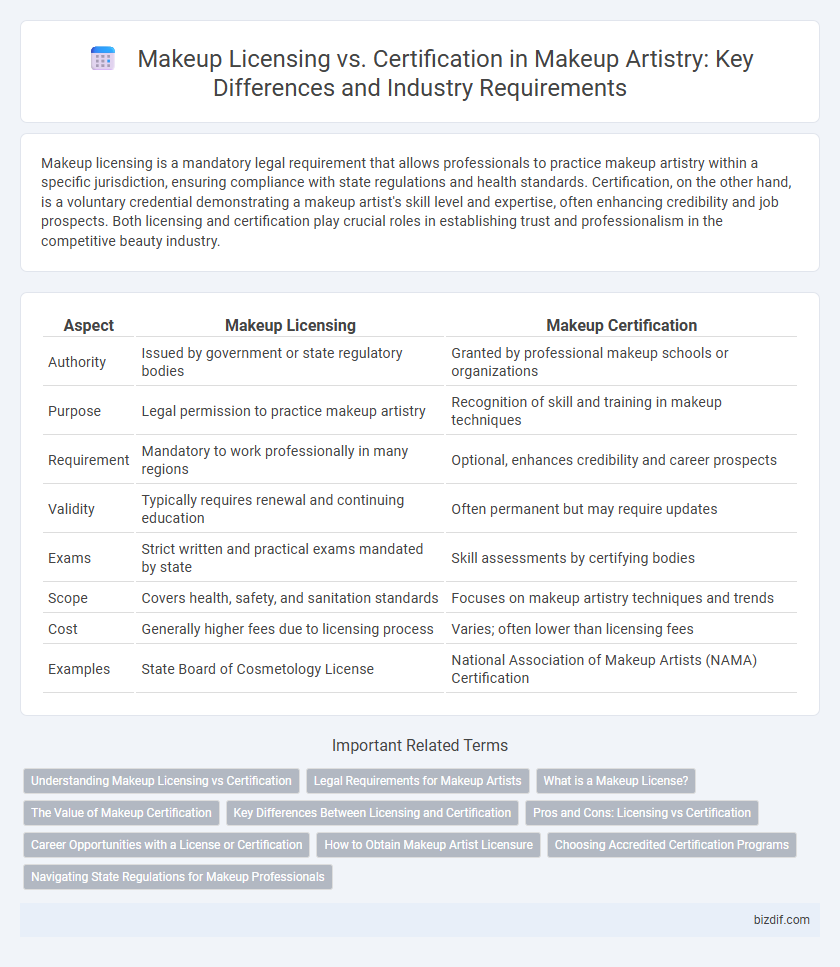Makeup licensing is a mandatory legal requirement that allows professionals to practice makeup artistry within a specific jurisdiction, ensuring compliance with state regulations and health standards. Certification, on the other hand, is a voluntary credential demonstrating a makeup artist's skill level and expertise, often enhancing credibility and job prospects. Both licensing and certification play crucial roles in establishing trust and professionalism in the competitive beauty industry.
Table of Comparison
| Aspect | Makeup Licensing | Makeup Certification |
|---|---|---|
| Authority | Issued by government or state regulatory bodies | Granted by professional makeup schools or organizations |
| Purpose | Legal permission to practice makeup artistry | Recognition of skill and training in makeup techniques |
| Requirement | Mandatory to work professionally in many regions | Optional, enhances credibility and career prospects |
| Validity | Typically requires renewal and continuing education | Often permanent but may require updates |
| Exams | Strict written and practical exams mandated by state | Skill assessments by certifying bodies |
| Scope | Covers health, safety, and sanitation standards | Focuses on makeup artistry techniques and trends |
| Cost | Generally higher fees due to licensing process | Varies; often lower than licensing fees |
| Examples | State Board of Cosmetology License | National Association of Makeup Artists (NAMA) Certification |
Understanding Makeup Licensing vs Certification
Makeup licensing is a legal requirement set by state or local regulatory agencies, granting permission to practice professionally and ensuring adherence to health and safety standards. Certification, often provided by private organizations or schools, validates specific skills and expertise but does not replace the necessity of licensing for legal practice. Understanding the distinction between makeup licensing and certification is essential for artists to comply with regulations while showcasing their proficiency.
Legal Requirements for Makeup Artists
Makeup licensing establishes legal authorization for makeup artists to practice professionally, ensuring compliance with state or regional health and safety regulations. Certification validates a makeup artist's skills and knowledge but does not grant the legal right to operate without a license where required. Understanding and obtaining the appropriate licensing is essential to legally provide makeup services and avoid potential legal penalties.
What is a Makeup License?
A makeup license is an official authorization granted by a regulatory body allowing a makeup artist to legally provide professional makeup services within a specific jurisdiction. This license ensures compliance with health, safety, and hygiene standards, protecting both the artist and clients. Unlike certification, a license is typically mandatory to operate professionally and may require passing exams, background checks, and continuous education.
The Value of Makeup Certification
Makeup certification validates an artist's skills through formal training and standardized exams, enhancing credibility and client trust in competitive markets. Unlike licensing, which is often legally required to practice in certain regions, certification demonstrates advanced expertise and commitment to industry standards. Earning a recognized makeup certification can open doors to higher-profile jobs, partnerships, and professional development opportunities.
Key Differences Between Licensing and Certification
Makeup licensing legally permits artists to offer services within specific jurisdictions, ensuring compliance with health and safety regulations, while certification validates an artist's skills and knowledge without granting legal permission to practice. Licensing often requires passing state-mandated exams and periodic renewals, whereas certification is typically granted by professional organizations through coursework or portfolio review. Understanding these key differences helps aspiring makeup artists navigate regulatory requirements and enhance professional credibility effectively.
Pros and Cons: Licensing vs Certification
Makeup licensing ensures artists meet state-mandated health and safety standards, providing legal authorization to practice, but it often involves costly exams and ongoing fees. Certification offers specialized training and skill validation from professional organizations, enhancing credibility without always requiring government approval, though it may lack uniform recognition across regions. Choosing licensing guarantees compliance and legal practice rights, whereas certification boosts professional development and marketability but may not replace licensing requirements.
Career Opportunities with a License or Certification
Obtaining a makeup license often leads to broader career opportunities, including working in film, television, and high-end salons where legal compliance is mandatory. Certification enhances professional credibility and can open doors to specialized roles such as bridal makeup artist or theatrical makeup designer. Both credentials increase access to networks and job platforms, boosting overall employability in the competitive makeup artistry industry.
How to Obtain Makeup Artist Licensure
Obtaining a makeup artist license typically requires completing a state-approved cosmetology or esthetician program followed by passing a licensing exam that tests practical skills and safety knowledge. Requirements vary by state, but most mandate a set number of training hours and formal education at accredited beauty schools or specialized makeup academies. Maintaining licensure often includes continuing education and renewal fees to ensure adherence to industry standards and health regulations.
Choosing Accredited Certification Programs
Choosing accredited certification programs is essential for makeup artists seeking industry recognition and career advancement. Accredited programs ensure comprehensive training in cosmetic techniques, hygiene standards, and client safety, aligning with state regulations and professional requirements. Opting for certification from recognized institutions enhances credibility, increases job opportunities, and demonstrates a commitment to maintaining high-quality makeup artistry skills.
Navigating State Regulations for Makeup Professionals
Makeup licensing and certification serve distinct roles in navigating state regulations for makeup professionals, with licensing often mandatory to legally practice while certification is typically voluntary and demonstrates specialized skills. Licensing requirements vary significantly by state, encompassing health and safety standards, practical exams, and continuing education to ensure consumer protection. Makeup artists must thoroughly research state-specific regulations to comply with legal mandates and enhance their professional credibility through recognized certification programs.
Makeup licensing vs Certification Infographic

 bizdif.com
bizdif.com